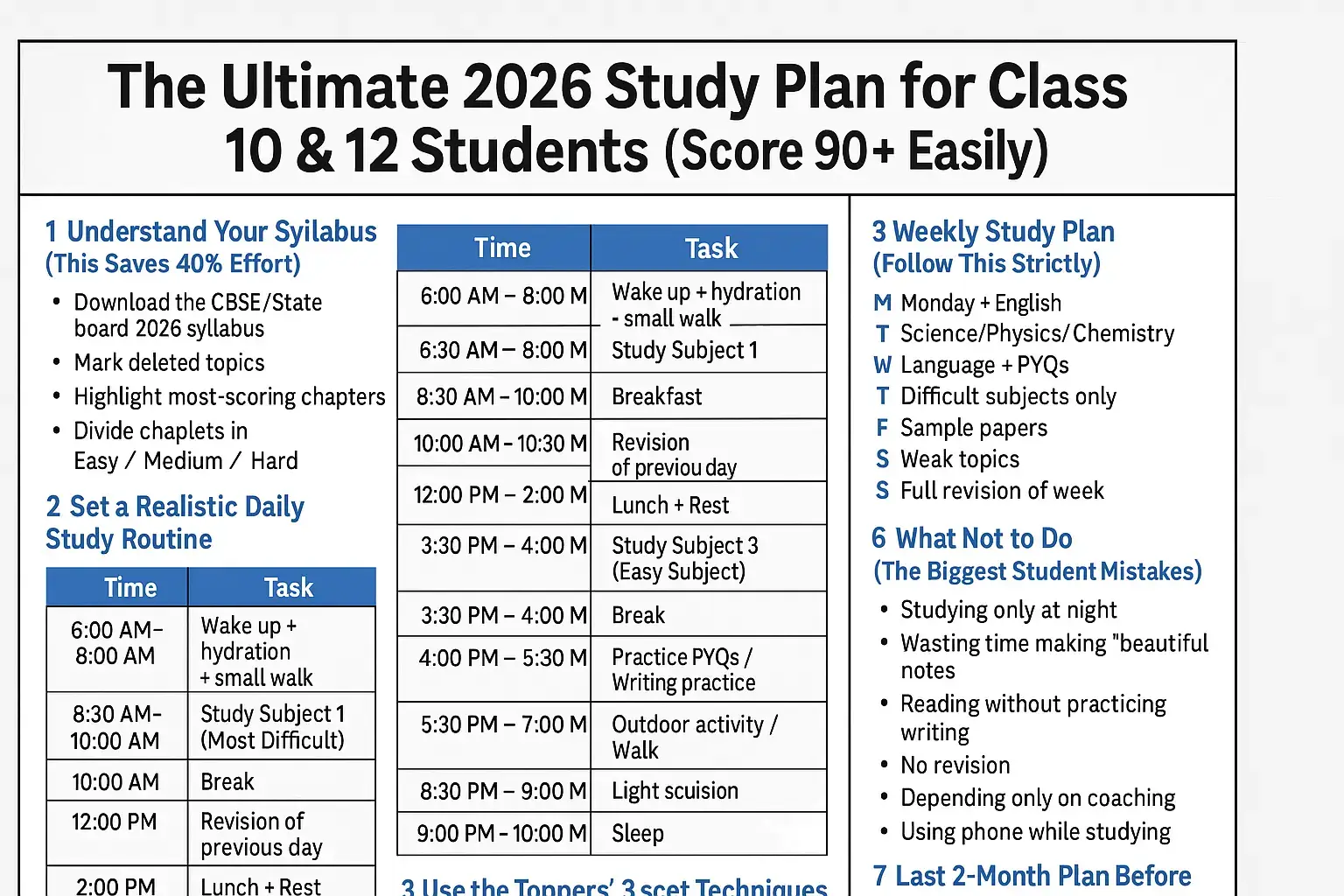Preparing for the 2026 board exams can feel overwhelming, but trust me — with the right study plan, you can score 90+ without burning out.
This guide gives you a realistic, easy-to-follow, topper-style plan that ANY student can follow.
This isn’t a one-size-fits-all plan. It’s designed for real students who have school, tuition, assignments, and still want to maintain a healthy lifestyle.
Let’s jump in.
⭐ Step 1: Understand Your Syllabus (This Saves 40% Effort)
Before studying, know what to study.
Do this first:
- Download the official CBSE/State board 2026 syllabus
- Mark deleted topics
- Highlight most-scoring chapters
- Divide chapters in Easy / Medium / Hard
Why this works:
Toppers don’t study everything equally — they study smart.
⭐ Step 2: Set a Realistic Daily Study Routine
Here is a perfect, scientifically-backed daily study plan:
📅 Daily Timetable for Class 10 & 12 Students (2026)
| Time | Task |
|---|---|
| 6:00 AM – 6:30 AM | Wake up + hydration + small walk |
| 6:30 AM – 8:00 AM | Study Subject 1 (Most Difficult) |
| 8:00 AM – 8:30 AM | Breakfast |
| 8:30 AM – 10:00 AM | Study Subject 2 (Medium Level) |
| 10:00 AM – 10:30 AM | Break |
| 10:30 AM – 12:00 PM | Revision of previous day |
| 12:00 PM – 2:00 PM | Lunch + Rest |
| 2:00 PM – 3:30 PM | Study Subject 3 (Easy Subject) |
| 3:30 PM – 4:00 PM | Break |
| 4:00 PM – 5:30 PM | Practice PYQs / Writing practice |
| 5:30 PM – 7:00 PM | Outdoor activity / Walk |
| 7:00 PM – 8:30 PM | Quick revision + Notes improvement |
| 8:30 PM – 9:00 PM | Dinner |
| 9:00 PM – 10:00 PM | Light study / reading |
| 10:00 PM | Sleep |
✔ Works for all streams
✔ Focuses more on mornings (best retention time)
✔ Includes PYQs & revision daily
⭐ Step 3: Weekly Study Plan (Follow This Strictly)
A weekly structure helps you build consistency.
📌 Weekly Plan Breakdown
- Monday: Maths + English
- Tuesday: Science/Physics/Chemistry
- Wednesday: Language + PYQs
- Thursday: Difficult subjects only
- Friday: Sample papers
- Saturday: Weak topics
- Sunday: Full revision of the week
⭐ Step 4: Monthly Study Plan (This Builds Exam Confidence)
Your monthly plan should rotate between:
✔ Month 1
Complete 80% syllabus (Easy + Medium chapters)
✔ Month 2
Complete remaining 20% + Make notes
✔ Month 3
Start revision round 1 + give 15–20 mock tests
✔ Month 4
Revision round 2 + solve previous 10 years papers
✔ Month 5
Final polish + writing practice
⭐ Step 5: Use the Toppers’ 3 Secret Techniques
1️⃣ Active Recall
Close your book and try to write the answer from memory.
2️⃣ Pomodoro Method
Study 50 mins → break 10 mins → repeat
3️⃣ Spaced Repetition
Revise after
Day 1 → Day 3 → Day 7 → Day 21
These are scientifically proven study techniques.
⭐ Step 6: What Not to Do (The Biggest Student Mistakes)
❌ Studying only at night
❌ Wasting time making “beautiful notes”
❌ Reading without practicing writing
❌ No revision
❌ Depending only on coaching
❌ Using phone while studying
⭐ Step 7: Last 2-Month Plan Before Exam (Super Important)
60-Day Formula
- 30 days — Chapter-wise revision
- 20 days — Solve sample papers
- 10 days — Full mock tests
This boosts your speed, accuracy, and confidence.
💡 Final Tips to Score 90+
✔ Study 3 major subjects daily
✔ Write more, read less
✔ Keep one notebook ONLY for mistakes
✔ Sleep well — memory depends on sleep
✔ Avoid comparing with others
❓ FAQs: Study Plan for Class 10 & 12 (2026)
1. How many hours should I study in Class 10?
6–7 hours of focused study is enough if you’re consistent.
2. How many hours for Class 12?
7–8 hours is ideal, including revision + writing practice.
3. Is coaching necessary?
No. Schools + self-study + PYQs are enough to score 90+.
4. Which is the best time to study?
Morning (6 AM – 10 AM) is scientifically proven to be best.
5. How many mock tests to give?
Minimum 15–20 before board exams.

